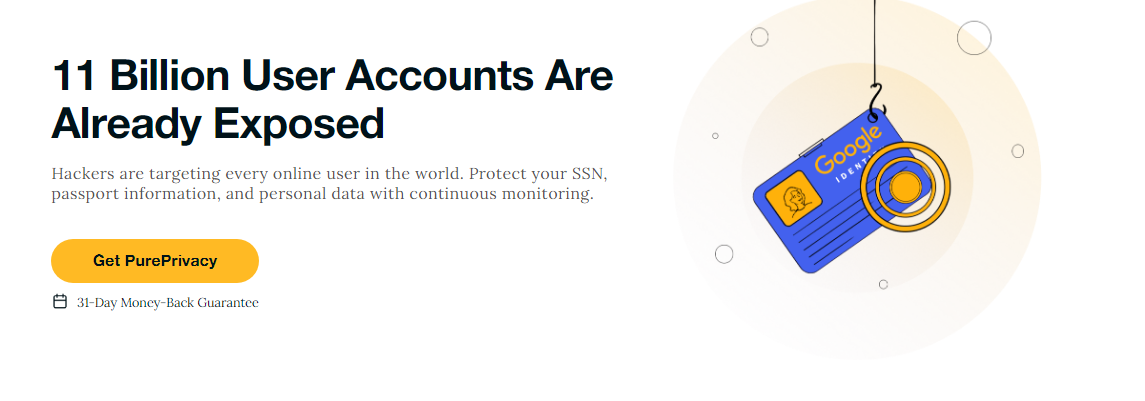A Florida-based data broker, National Public Data, has declared bankruptcy following a massive data breach that exposed the personal information of hundreds of millions of individuals.
The company's parent company, Jerico Pictures, filed for Chapter 11 bankruptcy protection in a Florida court, citing the significant financial burden of lawsuits and regulatory investigations stemming from the breach.
What Happened in the National Public Data Breach?
In April 2024, a hacker claimed to have breached National Public Data's systems and stolen billions of records, including names, dates of birth, email addresses, phone numbers, and Social Security numbers. The stolen data is estimated to have affected around 300 million people, making it one of the largest data breaches of the year.
Discover if Your Most Critical Identifiers Have Been Exposed on the Dark Web
Receive timely alerts and actionable insights with PurePrivacy's Dark Web Monitoring.
What Was the Impact on National Public Data Customers?
The data breach has had a significant impact on National Public Data's customers, who are now at risk of identity theft and other fraudulent activities. The company faces a wave of lawsuits from affected individuals seeking compensation for the damages caused by the breach.
NOTE: Opt-Out from National Public Data
Who Was Behind the Data Breach?
A notorious hacker, USDoD, was arrested in Brazil. USDoD leaked data and taunted victims. After targeting CrowdStrike, the team identified him as a 33-year-old Brazilian named Luan BG. This information likely helped Brazilian police arrest him in "Operation Data Breach."
How to Take Immediate Action in Case of a Data Breach
If you believe you may have been affected by the National Public Data data breach, it's important to take immediate action to protect yourself. Here are some steps you can take:
Monitor Your Accounts
Keep a close eye on your bank and credit card statements for any unauthorized activity.
Freeze Your Credit Cards
Place a credit freeze on your credit report to prevent new accounts from being opened in your name.
Sign Up for Credit Monitoring
Consider signing up for a credit monitoring service to help detect potential fraud and get alerts in case of a breach.
Report the Breach Immediately
File a complaint with the Federal Trade Commission and your local law enforcement agency.
Be Wary of Phishing Attempts
Be vigilant for phishing emails or calls that may attempt to trick you into revealing personal information.
Review Privacy Settings
Check the privacy settings on your social media accounts and other online platforms to ensure your information is not publicly accessible.
Minimize the Damage During Data Breaches With PurePrivacy
PurePrivacy is a complete privacy and security solution to protect your information from online threats. PurePrivacy gives you all the options to take charge of your online privacy.
- Use Dark Web Monitoring to proactively search the dark web for compromised personal data, including credit card numbers, emails, and passwords.
- Use Tracker Blocker to track and disable outside trackers that monitor your internet activity.
- Use Remove My Data to simplify sending data removal requests to the services and websites that manage your personal data.
- Use Social Privacy Manager to detect possible weaknesses by examining your social media privacy settings.

Monitor the Dark Web 24/7
Get quick notifications to take immediate precautions against identity theft and protect your accounts by continuous scanning.
Block Unwanted Trackers
Enhance your privacy and reduce targeted ads by blocking websites or domains from gathering and sharing your browsing data.
View & Send Data Removal Requests
Simplify and automate opt-out requests to data brokers by tracking the requests and minimizing the quantity of information accessible online.
Enhance Social Media Privacy Settings
Get suggestions on protecting your privacy on well-known platforms and reducing the possibility of illegal access to your personal data.
Frequently Asked Questions (FAQs)
-
How did National Public Data obtain my personal information?

National Public Data acquires personal information from various public sources, including:
Public record databases
Court records
State and national databases
Other repositories such as data brokers and third-party vendors. -
Was National Public Data hacked?

Yes. National Public Data, a Florida-based data broker, experienced a major data breach. The company publicly acknowledged the incident, though reports suggest the breach may have occurred much earlier. This breach exposed the sensitive personal information of millions of people.
-
Can I be the target of this NPD data breach?

Yes, you could potentially be a target of the National Public Data data breach. If your personal information is publicly available, it could have been included in the stolen data.
-
How can I remove my information from the National Public Data website?

You can follow the website instructions to opt out of the platform. The process may take time and effort and might not ensure data deletion. PurePrivacy can help you automatically opt out of data broker sites, without the fear of being tracked again and being the victim of the data breach.
Is Your Data Safe?
The National Public Data data breach is a reminder of the importance of data security. As we become increasingly reliant on digital technology, it's essential to take steps to protect our personal information from cyber threats. Your data is available online and you could be the next target of a data breach! Stay anonymous and remove your publicly available data with PurePrivacy.





